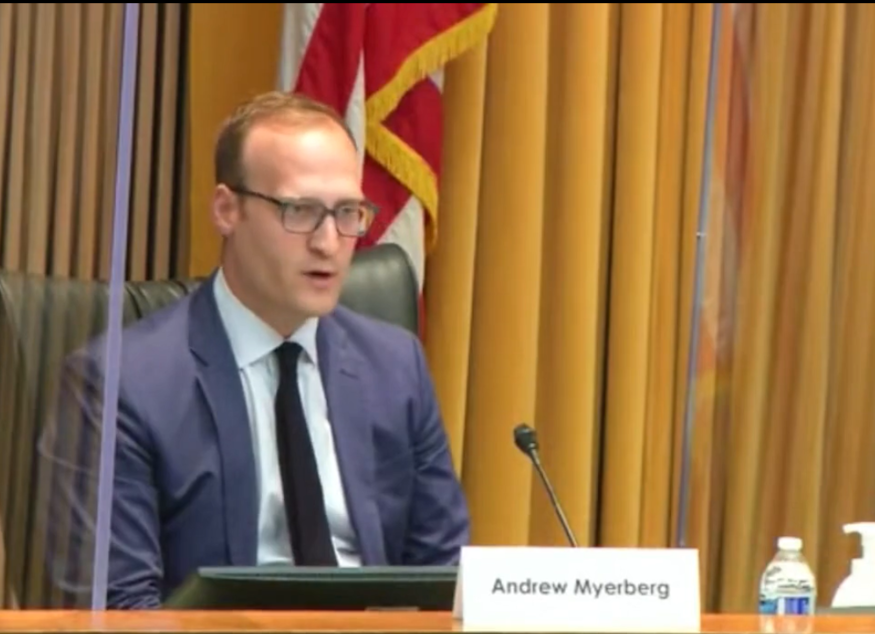Seattle’s police watchdog wants a job in Phoenix. Two former city employees aim to thwart him

Andrew Meyerberg, the head of the office that oversees police accountability, appears to want out of Seattle.
“The job has a shelf life,” Myerberg said. “It's a really difficult job, and it's a stressful job.”
Myerberg is a finalist for a job with the City of Phoenix for a position similar to the one he currently has, overseeing a recently created department like Seattle’s accountability office.
“I've been pretty clear with folks, and this has been for years, that I wasn't going to renew my term,” Myerberg said. His term expires next year, on Dec. 31, 2022.
Adding to the strain was the summer of 2020, which saw thousands of complaints against Seattle officers as people protested against police brutality and police unleashed pepper spray and blast balls.
Sponsored
Internally, too, there’s been tension. Two former employees with a partner agency, the Seattle Office of Inspector General, are trying to curb Myerberg’s chances.
These former employees published an open letter to the people of Phoenix, denouncing Myerberg. They redacted their names from the letter, and KUOW is not naming them at their request. They said they worry about retaliation from pro-cop supporters.
“Mr. Myerberg does not appear to be qualified, able, or willing to take action toward genuine accountability for the police, even those under his own direct supervision,” the letter reads.
While the Office of Police Accountability investigates citizen complaints into police behavior, it’s the job of Seattle’s Office of Inspector General to ensure these investigations are done adequately and fairly. These two former employees worked with Myerberg in their capacity as investigators who reviewed police accountability examinations.
These former investigators said that when they brought up issues within the police accountability office, as required by their job, they were dismissed.
Sponsored
Before being fired, one of the former employees said they faced aggressive behavior from a sergeant working with the police accountability office, according to records obtained by KUOW. They said the sergeant questioned their credentials and got in their face.
The former employee sent the city a demand letter, the precursor to a lawsuit, for damages in 2019. They wrote that the police accountability office – Myerberg’s office – “appeared to be increasingly resistant to oversight” by the Office of Inspector General. The former employee said their boss warned them to maintain “collegial relations.”
Then there was an ethics complaint filed by a former Office of Inspector General employee this year. As was first reported by the South Seattle Emerald, the other employee resigned in August, and filed a formal ethics complaint against Inspector General Lisa Judge and Deputy Inspector General Amy Tsai.
The complaint said that when they raised concerns about Myerberg inaccurately depicting events in investigation findings, their complaints went unaddressed. They said they were told by the Office of Inspector General leadership not to criticize the police accountability office in writing, to avoid releasing information to the press through public disclosure requests.
Sponsored
“OIG takes its role in the accountability system seriously and understands that transparency and maintaining public trust are critical,” Inspector General Lisa Judge said by email. “We are proud of the work that we do and value the objectivity and independence that characterize our work product.”
The Seattle Ethics and Elections Commission and human resources took no action, Myerberg said. A commission employee would not elaborate on the complaint's status, citing a general policy against disclosure.
The former employee who filed the complaint said they were told by the Ethics and Elections Commission that they didn't consider the complaint an ethics issue, and told by human resources that it wasn't within their purview.
Among the former employees’ concerns, as outlined in their open letter, is Myerberg’s past work.
Before coming to the watchdog office, Myerberg was lead attorney representing Seattle in the federal consent decree imposed on the police department. Before that, Myerberg helped defend police in New York City against civil lawsuits, including legal action brought forward by the Central Park Five, a group of Black men who were wrongfully convicted of assault as teenagers in the early ‘90s.
The letter cites when Myerberg was assistant city attorney, and Seattle was prosecuting a paraplegic Black and Indigenous man accused of assaulting officers.
Sponsored
One of the two former Inspector General employees worked to defend the man who, according to the letter, was in his wheelchair outside a hospital when police allegedly threw him to the ground.
The defense requested files that outlined the histories of the arresting officers.
“The City resisted providing this evidence,” said the former employee’s demand letter to the city. Myerberg had agreed to give files to the judge for review. The judge would then decide what should be released to the defense.
Before that could happen, the employee letter continues, a paralegal took the files from the judge’s chambers and told the bailiff they would be delivered to the defense instead, but were not.
The criminal case against this paraplegic man was dismissed for discovery violations.
Sponsored
Myerberg said he wasn’t involved in the delivery of the records.
“There may have been some confusion when they said, ‘Okay, then we'll deliver them to defense counsel, and that didn't happen,’” he said. “But the fact is, they were delivered to the judge. So the records are not being withheld, the records were produced.”
A City of Phoenix employee said that they search the online presence of all candidates and they’re taking everything into account when making their decision. They anticipate filling the position by the end of October.
A previous version of this article has been corrected to reflect that the case was dismissed for SPD violations of discovery.

